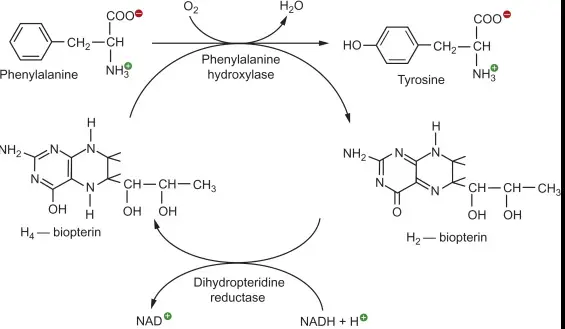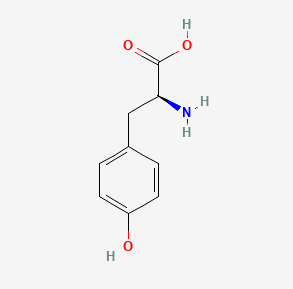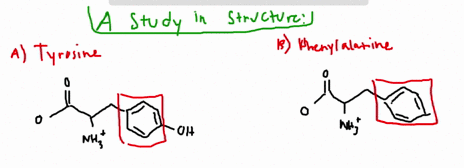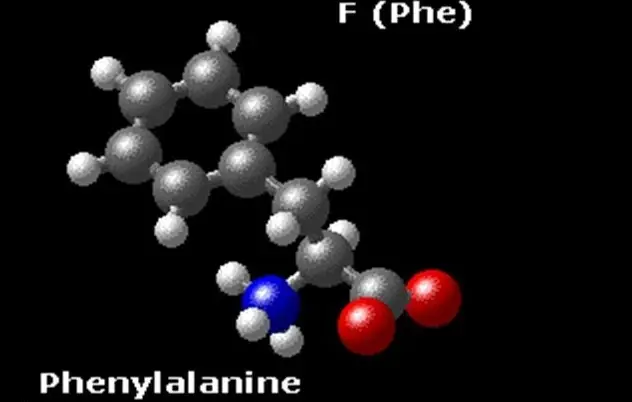Amino acids are fundamental building blocks of life, each playing distinct roles in various biological processes. Among them, phenylalanine and tyrosine stand out due to their unique functions and pathways in the human body. These amino acids are not only essential for protein synthesis but also vital for the production of several significant hormones and neurotransmitters.
Phenylalanine is an essential amino acid, meaning it must be obtained through diet as the body cannot produce it on its own. It is a precursor to tyrosine, another amino acid that is derived from phenylalanine and is crucial for creating neurotransmitters such as dopamine, epinephrine, and norepinephrine. The transformation from phenylalanine to tyrosine is a critical metabolic pathway that impacts both mental and physical health.
Tyrosine, while non-essential as it can be synthesized from phenylalanine, is no less important. It supports adrenal, thyroid, and pituitary functions and is a precursor to vital substances that regulate mood, cognition, and response to stress. The interplay between these two amino acids supports not only metabolic health but also influences broader physiological and psychological well-being.

Phenylalanine Basics
Definition and Role
Phenylalanine is an essential amino acid, which means it cannot be synthesized by the human body and must be obtained through the diet. This amino acid is a building block for protein synthesis and serves as a precursor to several other important molecules, including tyrosine, dopamine, norepinephrine, and epinephrine. These compounds are vital for various physiological functions such as brain function, mood regulation, and energy metabolism.
Sources in Diet
Phenylalanine is found in a variety of dietary sources. High-protein foods are particularly rich in this amino acid. Here are some common sources:
- Meat and Poultry: Chicken, beef, pork, and turkey
- Fish: Salmon, tuna, and cod
- Dairy Products: Milk, cheese, and yogurt
- Nuts and Seeds: Almonds, peanuts, and pumpkin seeds
- Legumes: Soybeans and lentils
- Whole Grains: Quinoa and brown rice
Incorporating these foods into your diet ensures adequate intake of phenylalanine, which is crucial for maintaining overall health and supporting metabolic functions.
Tyrosine Basics
Definition and Role
Tyrosine is a non-essential amino acid, which the body can synthesize from phenylalanine. It plays a critical role in the production of several important neurotransmitters, including dopamine, norepinephrine, and epinephrine. These neurotransmitters are essential for brain function, influencing mood, alertness, and the stress response. Additionally, tyrosine is a precursor to the thyroid hormones thyroxine and triiodothyronine, which regulate metabolism.
Dietary Sources
While the body can make tyrosine from phenylalanine, it is also found in many high-protein foods, similar to phenylalanine. Some of the rich dietary sources include:
- High-Protein Foods: Chicken, turkey, and fish
- Dairy Products: Cheese, milk, and yogurt
- Nuts and Seeds: Sesame seeds, pumpkin seeds, and almonds
- Beans and Legumes: Soy products, lima beans
- Whole Grains: Oats and wheat
Regular consumption of these foods helps maintain sufficient levels of tyrosine, particularly important for individuals with metabolic conditions affecting amino acid synthesis.
Biosynthesis Pathway
From Phenylalanine to Tyrosine
The conversion of phenylalanine to tyrosine is a crucial metabolic pathway in the human body. This process takes place primarily in the liver and is catalyzed by the enzyme phenylalanine hydroxylase. This enzyme requires molecular oxygen and a cofactor, tetrahydrobiopterin, to function effectively.
Enzymatic Reactions Involved
The specific steps involved in the conversion are as follows:
- Phenylalanine hydroxylase catalyzes the hydroxylation of phenylalanine to produce tyrosine.
- This reaction also produces water and requires oxygen, which is reduced during the process.
Proper function of this pathway is essential for maintaining normal levels of tyrosine, which is necessary for neurotransmitter synthesis and overall metabolic health.

Biological Functions
Phenylalanine Functions
Phenylalanine plays several key roles in the body:
- Protein Synthesis: As a fundamental component of proteins, it supports the growth and repair of body tissues.
- Neurotransmitter Production: It is a precursor to several neurotransmitters that regulate mood and cognitive functions.
- Hormone Production: It is involved in the synthesis of skin and hair pigment melanin.
Tyrosine Functions
Tyrosine is similarly crucial for:
- Neurotransmitter Synthesis: Essential for the production of dopamine, epinephrine, and norepinephrine, which affect mood and response to stress.
- Hormone Production: Necessary for the synthesis of thyroid hormones that regulate metabolism.
- Melanin Production: Tyrosine is a key ingredient in the production of melanin, the pigment responsible for the color of skin and hair.

Health Implications
Phenylalanine and Health
Phenylalanine is vital for the synthesis of neurotransmitters and other amino acids, impacting both mental and physical health. Its adequate intake is crucial for optimal brain function and emotional well-being. However, imbalances or excessive intake can lead to health issues, especially in individuals with certain metabolic disorders.
Tyrosine and Wellness
Tyrosine supports the production of hormones and neurotransmitters that regulate mood, energy levels, and the body’s response to stress. Its role in producing thyroid hormones also means it significantly affects metabolic rate and body weight management. Maintaining proper levels of tyrosine can contribute to overall wellness, enhancing mental performance and emotional stability.
Metabolic Disorders
PKU and Its Impact on Phenylalanine
Phenylketonuria (PKU) is a genetic disorder characterized by a deficiency in the enzyme phenylalanine hydroxylase. This deficiency leads to an accumulation of phenylalanine in the body, which can cause intellectual disability, developmental delays, and other serious health problems if not managed properly. Managing PKU involves adhering to a diet low in phenylalanine to prevent high levels that can damage the brain.
Tyrosine and Related Conditions
While not as commonly impacted by genetic disorders as phenylalanine, tyrosine metabolism can still be disrupted in certain conditions. For example, individuals with alkaptonuria, another rare genetic disorder, cannot properly break down tyrosine, leading to a buildup of homogentisic acid, which can cause damage to cartilage and lead to arthritis-like symptoms.
Clinical Uses
Therapeutic Uses of Phenylalanine
Phenylalanine is used in various therapeutic applications due to its role in neurotransmitter production. It is particularly noted for its use in treating:
- Depression: As a precursor to dopamine and norepinephrine, phenylalanine can help enhance mood and alleviate symptoms of depression.
- Chronic Pain: It may play a role in the management of pain through its effects on endorphins and other neurotransmitters.
Tyrosine in Medicine
Tyrosine is considered beneficial in several medical settings:
- Stress Reduction: Supplements may help improve cognitive function under conditions of stress and sleep deprivation.
- Mental Health: It can support the production of neurotransmitters that regulate mood and may assist in the treatment of depression and anxiety.
Supplement Use
Phenylalanine Supplements
Phenylalanine supplements are available and commonly used to support mental clarity, alertness, and mood. They must be used cautiously, especially among those with PKU, due to the potential for negative effects from excessive amounts.
Benefits of Tyrosine Supplements
Tyrosine supplements are often promoted for their potential to improve mental performance, reduce the effects of stress and fatigue, and support a healthy mood balance. They are typically considered safe for regular use, provided that dosages remain within recommended limits.

Comparative Analysis
Nutritional Comparison
Phenylalanine and tyrosine are both found in high-protein foods, but their importance in nutrition goes beyond simple protein synthesis. Phenylalanine is essential, requiring dietary intake, while tyrosine can be synthesized in the body from phenylalanine and thus is not essential, reducing dietary pressure.
Metabolic Distinctions
The primary metabolic difference between these two amino acids lies in their conversion and utilization pathways:
- Phenylalanine is hydroxylated to become tyrosine, an essential step that requires specific enzymes and cofactors.
- Tyrosine is directly involved in the synthesis of critical hormones and neurotransmitters, making its biochemical pathways vital for cognitive and metabolic functions.
FAQs
What is Phenylalanine?
Phenylalanine is an essential amino acid found in various protein-rich foods. It is crucial for the synthesis of other amino acids, including tyrosine, and is vital for the production of neurotransmitters and other amino acids.
What is Tyrosine?
Tyrosine is a non-essential amino acid produced from phenylalanine. It is vital for hormone production, including thyroid hormones and neurotransmitters like dopamine and adrenaline, which influence mood, alertness, and stress response.
How are Phenylalanine and Tyrosine related?
Phenylalanine is converted into tyrosine in the liver through a hydroxylation process that requires iron and vitamin C. This conversion is crucial for maintaining adequate levels of tyrosine, especially under conditions of stress or illness.
Why are Phenylalanine and Tyrosine important?
These amino acids play critical roles in the body’s synthesis of proteins and neurotransmitters. They affect mental health, cognitive function, and overall physiological processes, making them essential for wellness and vitality.
Can you take Phenylalanine and Tyrosine as supplements?
Yes, both phenylalanine and tyrosine are available as dietary supplements. They are often taken to support neurological functions and improve mood, alertness, and attention. However, dosage and safety should always be considered under healthcare advice.
Conclusion
Phenylalanine and tyrosine are pivotal in the landscape of amino acids due to their extensive roles in human metabolism and mental health. Understanding their functions and the metabolic pathways linking them provides valuable insights into their impact on overall wellness. These amino acids exemplify the intricate biochemical pathways that sustain life and health.
Their supplementation and dietary consideration are not just aspects of nutritional science but are integral to therapeutic strategies addressing a range of psychological and physiological disorders. Acknowledging their importance helps in crafting dietary and medical interventions that enhance human health and quality of life.

